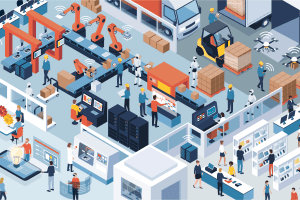Businesses cannot allow the pandemic to soften their focus on modern slavery

Ingrid Verschuren, Head of Data Strategy at Dow Jones, discusses the risks modern slavery poses to organisations’ business and why they need to be more vigilant – and how to do so.
More than 40 million people worldwide are trapped in modern slavery, a criminal business that generates an estimated US$150bn in illegal profits a year. Why should these numbers make every business leader pause for thought? Right now, 16 million of those victims could be working in the supply chains of international businesses. Post-coronavirus, that number could be even higher.
The pandemic has created the perfect breeding ground for modern slavery to thrive. Unprecedented levels of disruption have provided cover for organised crime syndicates to move victims of forced labour into new sectors. Recent Dow Jones research found that human traffickers were quick to respond to lockdowns, taking advantage of the global lax in due diligence during the pandemic to divert focus away from sex work towards forms of labour exploitation that are more likely to be part of corporate supply chains. According to the research, labour exploitation overtook sexual exploitation as the most reported trafficking type following the onset of the pandemic, making up 41% of all cases reported to NGOs.

While the world’s attention has been elsewhere, modern slavery has quietly become the fastest-growing criminal enterprise, hiding in plain sight. And although you may see the occasional social media post calling out modern slavery crimes, the truth is that widespread media coverage has decreased alongside the disruption caused by the pandemic. This has directly correlated to:
- a 25% drop in the volume of modern slavery-related news articles globally;
- an estimated 79% drop in the number of NGO-reported modern slavery cases globally;
- and a 10% drop in the volume of modern slavery-related tweets in a global sample.
Companies have been left more exposed to the risk of modern slavery following the pandemic, and many could be unwittingly falling foul of anti-slavery laws as a result. So what can businesses do to guarantee the integrity of their supply chains and keep their names out of the headlines once news about the pandemic begins to recede? There are three key areas business leaders need to focus on in order to mitigate risk successfully.
Double down on the data
Leaders must be more vigilant to the risks associated with modern slavery if they want to eradicate slavery from their supply chains, and keep their reputation intact. And it all starts with having access to the right data. Although criminals seek to anonymise themselves and their networks, data trails will always exist. So businesses need to understand what data they need to detect suspicious activity and build the fullest possible picture of their customers and suppliers.
News-derived data is one such example; media coverage from trusted sources can contain clues such as alias names or beneficial ownership information that help link individuals or companies to previous involvement with illicit activity. With hundreds of thousands of news articles published every day, access to a global news database such as Factiva can be a treasure trove of valuable insights that can help businesses identify and address a range of risks associated with modern slavery. Indeed, adverse media monitoring is now recognised by regulators as an integral part of the third-party due diligence process and helps organisations keep on top of potential risks as they emerge, in real-time.
Technology as the driving force for good
There are vast amounts of data that businesses can use to weed out bad actors. But a human could spend a lifetime trawling through that mountain of data and still not find the right nugget of information. This is where technology has an important role to play alongside humans in the fight against modern slavery.
Subject matter experts can train machines on what to look for, including the key indicators and typologies of human trafficking. Artificial intelligence is able to process tremendous amounts of information very quickly, working faster than humans ever could to identify red flags and uncover patterns in the data. This frees up time for the experts to conduct deeper due diligence on a suspicious individual or entity, enhance the content with supplementary information and identifiers, or investigate when no red flags are uncovered in high-risk scenarios.
Technology will also be a key enabler in bringing NGOs, governments and the private sector together to tackle this global crime. Combining the information held by these different organisations and news data and social media chatter will help us connect the dots and build a more complete picture of the traffickers. Only by working together will we be able to identify better, navigate, and address the issue.
Stand up and speak up
We know that countries with legislation have more public discourse around modern slavery. But governments are not the only actors that play a fundamental role in the fight against this heinous crime. Businesses have both a moral and regulatory obligation to better understand the increased risks associated with modern slavery—and play an active role in addressing it.
In 2015, the UK became the first country to require companies to publish a yearly transparency statement about actions and policies they implement to combat human trafficking. Last year, Parliament proposed measures to strengthen the Modern Slavery Act 2015, as well as plans to introduce financial penalties for businesses failing to publish annual modern slavery statements in a timely fashion.
We are also seeing increased scrutiny on human rights in UK foreign policy. Following its departure from the EU, the UK introduced the Global Human Rights Sanction Regulations, setting out its autonomous sanctions policy for dealing with human rights violations and abuses around the world. In March 2021, we saw this in action when the UK imposed sanctions against Chinese officials, citing serious human rights abuses in China’s Xinjiang region.
The regulatory landscape is only going to become more complex, and international regulatory bodies have made it clear that it is the responsibility of corporations with global supply chains to properly vet and monitor every link in their supply chains for evidence of human rights violations. Some national regulations even include provisions that allow filing civil and criminal proceedings against companies that fail to implement policies ensuring that their supply chain and operations are free from incidences of modern slavery.
Businesses need to take modern slavery and exploitation in their supply chains and operations seriously—and act now to tackle the issue. Compliance is not the place to cut corners. The costs are simply too great when human lives are at stake.
*January to June 2020 compared to similar time period in 2019
READ MORE:
- Scaleup Spotlight: Climeworks is the key to fighting climate change
- How Wi-Fi6 will optimise hybrid working
- Which European countries have the best and worst cybersecurity?
- McAfee: How to make telehealth safer for a more convenient life online
About Dow Jones
Dow Jones provides the data and expertise to help companies around the globe manage risk and stay compliant. Over 20 years we have built a database of over 3 million companies and individuals, helping our customers fulfil their regulatory obligations and ensure they really know who they are doing business with. Every day, we update that database with information gathered from 800,000 news articles from over 32,000 sources – supplementing these with government lists and other public records. Artificial Intelligence is able to scour a tremendous amount of data very quickly, working faster than humans ever could to extract the relevant information. But humans remain a crucial component in any compliance program.
For more news from Top Business Tech, don’t forget to subscribe to our daily bulletin!
